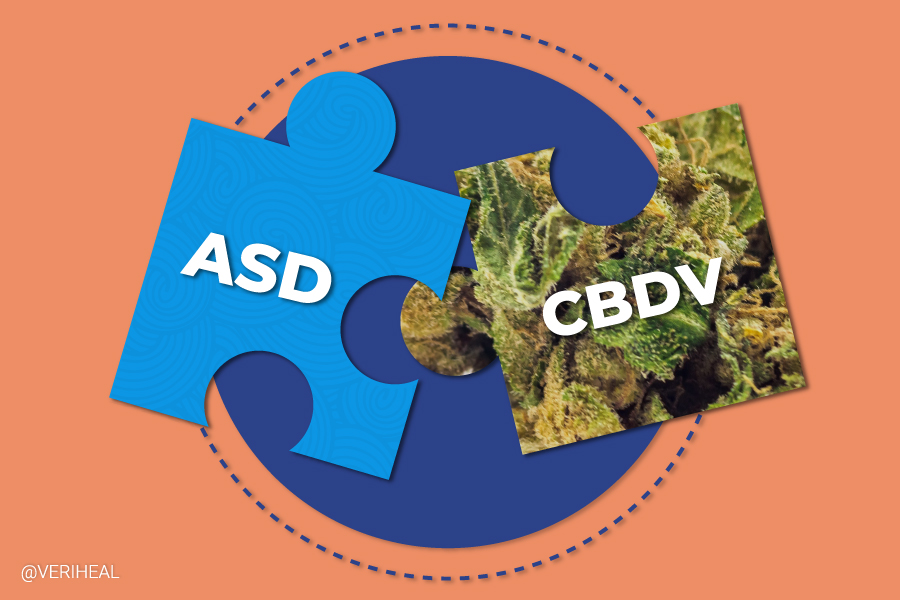There are more than a hundred different cannabinoids that can be found in the cannabis plant. Some of those cannabinoids have gotten a lot of attention and have gone on to become superstars and those include cannabidiol (CBD) and tetrahydrocannabinol (THC). It seems that CBD and THC may have some competition as cannabidivarin (CBDV) gains interest and is being examined in more and more clinical trials. CBDV has now also shown great promise as a revolutionary treatment for Autism Spectrum Disorder.
Autism Spectrum Disorder Briefly Explained
Autism Spectrum Disorder (ASD) is a broad term that is used to categorize individuals with challenges in social skills, have repetitive behaviors, as well as challenging and repetitive speech and nonverbal communication. There are many subtypes of ASD which are influenced by a variety of genetic and environmental factors. Since autism is a spectrum disorder, each individual with it has a distinct set of strengths and challenges. Types of spectrum disorders include Autism Disorder, Asperger’s Syndrome, Pervasive Developmental Disorder, Not Otherwise Specified, Childhood Disintegrative Disorder, and Rett Syndrome.
What is CBDV?
Cannabidivarin (CBDV) is a non-intoxicating cannabinoid and is typically found in strains with lower THC quantity as well as presenting predominantly in indica-dominant strains. As you could probably guess by the name, CBDV is a homolog of the cannabinoid CBD, which means that CBD is the ancestor of CBDV and that they share similarities. Due to the demonstrated neurochemical pathway for previously observed anti-epileptic and anti-convulsive properties, GW Pharmaceuticals is actively developing CBDV as GWP42006.
Research that Supports CBDV for ASD
Cannabidivarin has shown promise in meeting currently unmet needs in terms of treatment for ASD. CBDV has been successful in pre-clinical studies for the disorders and is now being examined for safety and efficacy in a clinical study on children with ASD. While another study took to reporting the experience of parents who administered cannabis to their children for their ASD. The pre-clinical studies found that CBDV has effective therapeutic effects on repetitive behaviors, irritability, social functioning, inflammation as well as improving the quality of life in the animal test subjects (mice). The cannabinoid has also been found to share the same anti-seizure and anti-epileptic properties as its ancestor CBD.
A study that explored CBDV for Autism Spectrum Disorder in rats found some impressive results. The study assessed rats who were prenatally exposed to valproic acid (VPA) so that they may present with ASD-like behavior. The study found that prenatal exposure to VPA affected their animals’ short-term memory, but that CBDV was able to reserve that damage to short-term memory. The VPA rats presented with compulsive grooming which plagues some with ASD. The same study found that CBDV had no significant effect on weight, which is often a complication associated with current ASD therapies. Additionally, the FDA has decided to grant CBDV an “orphan designation”, which means that the cannabinoid can be used as a medicine for rare conditions such as Rett syndrome and Fragile X. CBDV has also been found to decrease motor impairments and cognitive decline.
Why You Should Get Your Medical Marijuana Card
Veriheal has satisfied millions of patients nationwide by giving them access to these benefits
- Larger purchase limits
- Peace of mind
- Enhanced legal protection
- Access to higher potency strains
- Save up to 25% on cannabis purchases
- Skip the line at the dispensary
CBDV has shown to be a potentially effective treatment by addressing the following symptoms that are not always efficiently satisfied through conventional pharmaceutical therapies:
Around 25% of people with ASD end up suffering from treatment-resistant epilepsy. Just like CBD, CDBV can significantly reduce the frequency and severity of the seizures associated with epilepsy.
ASD patients have behavioral impairments which include acts of aggression and behavior that is self-injurious. Once again, CBDV shares its ancestor’s ability to reduce anxiety, stress, and intrusive thoughts which contribute to the onset of behavioral impairment. A study also found that CBDV administration drastically reduced behavioral issues in children.
-
Psychosocial and mental health
40% of people with ASD are plagued by anxiety and mood disorders. Fortunately, cannabinoids from the plant have proved their efficacy as anti-anxiety, antidepressant, and mood elevators time and time again. However, there is currently no research available that assesses CBDVs role specifically in terms of psychosocial and mental health.
ASD causes sleep disorders as comorbidity which is prevalent in around 40-80% of people suffering from the condition. CBDV can improve the quality of sleep, which could ultimately also improve mood.
CBDV has shown its great promise as an effective treatment for ASD due to the fact that it is gaining research popularity. This increase in the desire by researchers to investigate the cannabinoid has resulted in finding that the cannabinoid offers a variety of benefits in just one all-natural substance. The current known benefits for CBDV for ASD include no effect on weight, anti-epileptic and anti-seizure, decrease motor impairments, decrease cognitive decline, the decline in behavioral impairments, improved quality of sleep, elevating mood, and ultimately improving the quality of life.
Author, Share & Comments
















